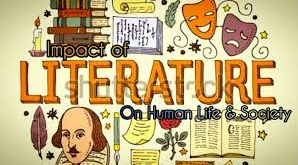
Muhammad Sufyan
Literature is a form of human expression. It has long been a fundamental part of human beings. It traces back to the era of hunter-gatherers. Folklores were common among them; however, storytelling emerged as the human mind evolved which applied reasoning as a tool. The written forms of stories and folklore started in Mesopotamia about 3200 BC and then in ancient China about 1250 BC. The language played a central role in disseminating stories, folklore, poems and other forms of literature, which prevailed among diverse societies. It represents the people of the society, who live together, share a common mode of living, and have the same traditions.
The importance of literature is immense. Our perception changes when we read literature and interact with diverse people which improves our learning. Reading makes us able to comprehend the perspectives of the writers as well as their cultural backgrounds. It helps to understand others and the world around us and creates a sense of belonging to other communities. The books written by different authors give us access to understanding his perspective and respect his culture. Reading helps us understand different situations that we don’t experience but still, we can see ourselves in those situations, making a broader perspective of ourselves, entrenching a deep understanding of others, and diversifying our attitude toward other’s perspectives.
Civilizations have evolved through literature, by getting a sense of diversity and by exchanging statements delivered by literature. Societies exchange diverse ideas, traditions, and complex forms of materialism among themselves, fostering a sense of belonging and bridging the gaps of harmonious relations between them. Literature has been the voice of the oppressed in the course of history. People, where there was no freedom of speech, represented their sorrows in the form of poetry, novels, etc. During the American Civil War (1861-1865), Ralph Waldo Emerson_ who was an American poet, essayist, and philosopher during the 19th century_ wrote about slavery:
“Emancipation is the demand of civilization. That is a principle; everything else is an intrigue.”
Emerson was convinced that slavery should be abolished, as every individual is born free and equal to other fellow individuals. It is the building block of civilizations on which it nourishes.
Nevertheless, modern literature is being dispensed through electronic devices, like radio, TV, and mobiles. But not everything that is being circulated among societies is literature; journalism, business etc., are excluded from the orbit of literature. Societies are directly impacted by the essence of literature, diffusing a culture of mutual association among people and giving it a common identity. It tells about the prestigious heritage of our forefathers, and how they preserved their traditions, culture, and pattern of life. The Nation’s history is displayed by the national TV channel, by plays, dramas and documentaries, to present the heritage of the forefathers, foster a sense of identity and create a common recognition. Literature refines language and leads toward evolution and the development of new languages. When people read stories written by well-known writers, it helps to improve its multiple uses in its convincing and compelling style. So, the writings of capable writers are the constant source of learning and developing many uses of language. For instance, Shakespeare is named a well-known contributor to the English language because he added multiple writing expressions to the English language.
People and societies are raw materials of literature. The writers incorporate the voices of their people on behalf of them which helps the upward mobility of society. It shapes our way of life, enriching it with colours of harmony. The writers and the readers share the same experience and become a collective voice. So, the pattern of literary interplay between the writers and the readers establishes an amalgamation of integration, mutual cooperation, and the communal affiliations among the individuals of societies.
Writer Is Student at Qauid e Azam University Islamabad. He can be reached at [email protected]





